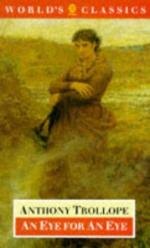his religious fanaticism he could entertain no compassion
whatever. Father Marty was no great politician,
and desired no rebellion against England. Even
in the days of O’Connell and repeal he had been
but luke-warm. But justice for Ireland in the
guise of wealthy English husbands for pretty Irish
girls he desired with all his heart. He was true
to his own faith, to the backbone, but he entertained
no prejudice against a good looking Protestant youth
when a fortunate marriage was in question. So
little had been given to the Irish in these days,
that they were bound to take what they could get.
Lord Scroope and the Countess, had they known the
priest’s views on this matter, would have regarded
him as an unscrupulous intriguing ruffian, prepared
to destroy the happiness of a noble family by a wicked
scheme. But his views of life, as judged from
the other side, admitted of some excuse. As for
a girl breaking her heart, he did not, perhaps, much
believe in such a catastrophe. Of a sore heart
a girl must run the chance,—as also must
a man. That young men do go about promising marriage
and not keeping their promise, he knew well.
None could know that better than he did, for he was
the repository of half the love secrets in his parish.
But all that was part of the evil coming from the
fall of Adam, and must be endured till,—till
the Pope should have his own again, and be able to
set all things right. In the meantime young women
must do the best they could to keep their lovers;—and
should one lover break away, then must the deserted
one use her experience towards getting a second.
But how was a girl to have a lover at all, if she
were never allowed to see a man? He had been
bred a priest from his youth upwards, and knew nothing
of love; but nevertheless it was a pain to him to
see a young girl, good-looking, healthy, fit to be
the mother of children, pine away, unsought for, uncoupled,—as
it would be a pain to see a fruit grow ripe upon the
tree, and then fall and perish for the want of plucking.
His philosophy was perhaps at fault, and it may be
that his humanity was unrefined. But he was human
to the core,—and, at any rate, unselfish.
That there might be another danger was a fact that
he looked full in the face. But what victory
can be won without danger? And he thought that
he knew this girl, who three times a year would open
her whole heart to him in confession. He was
sure that she was not only innocent, but good.
And of the man, too, he was prone to believe good;—though
who on such a question ever trusts a man’s goodness?
There might be danger and there must be discretion;
but surely it would not be wise, because evil was
possible, that such a one as Kate O’Hara should
be kept from all that intercourse without which a
woman is only half a woman! He had considered
it all, though the reader may perhaps think that as
a minister of the gospel he had come to a strange
conclusion. He himself, in his own defence, would
have said that having served many years in the ministry
he had learned to know the nature of men and women.




